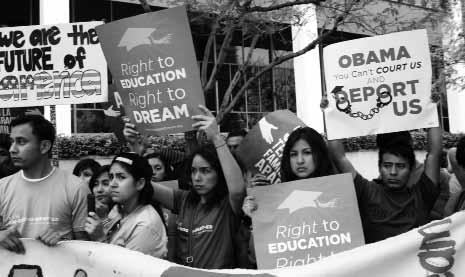“Modernizing” education reforms and the attack on teacher organizations in Ecuador
Edgar Isch L.*
UNE hits the streets to reject unpaid increase in teaching hours.
Neoliberal policies were imposed on Ecuador in a comprehensive way from the 1980s until 2007. However, indigenous and popular organizations, including the National Union of Teachers (UNE) and student organizations (mainly the federations of university and secondary students, FEUE and FESE respectively), were able to mount powerful resistance and prevent the complete application of neoliberalism. This popular struggle also led to Rafael Correa becoming president and the start of a government that was based on the support of the popular movements and that declared itself to be anti-neoliberal. At the beginning, this government carried out some important actions and established constitutional principles that responded to the social demands of past decades. Later, however, it became more identified with the kind of “modernization” that bolsters capitalism while maintaining some social democratic measures. Among the positive aspects of the government’s early years, increased funding for education must be acknowledged. In addition, there was an increase in the number of public schools, particularly in marginalized urban areas, providing school breakfasts and lunches (although in 2013 the lunch was eliminated and an “enhanced breakfast” offered instead). Free uniforms were given to students in rural schools and textbooks to about three million elementary students. *Profesor at the Central University of Ecuador. Member of the IDEA Education Research Network.
However the idea of modernizing by copying the world powers was expressed by President Correa himself: We must globalize in order to compare ourselves with the best… to aspire to the highest level: a system of higher education that can stand among the best in the world (cited by Vidoz, 2014). Increasingly, the focus has been on following the hegemonic measures of developed countries: university entrance exams; standardized testing; private programmes such as the International Baccalaureate; PISA tests; ranking of universities; almost complete destruction of university autonomy; diminishing the importance of humanities and social sciences and expanding technical programmes; dividing students into “winners” and “losers”; prioritizing “indexed journals” over scientific texts, among many others. Contradictorily, this is all being done with increased funding for public education, which more students have access to now than before, and through a broad scholarship programme which allows young Ecuadorians to study in foreign universities (currently more than 8,000). The legacy of neoliberalism is the idea that education should be at the service of corporations and their needs. This means that public resources are serving private interests. Even the new and very expensive university, created as a “City of Knowledge”, will carry out the research that industry requires and establish a mainly private industrial centre.
august 2015, Intercambio 7
11










